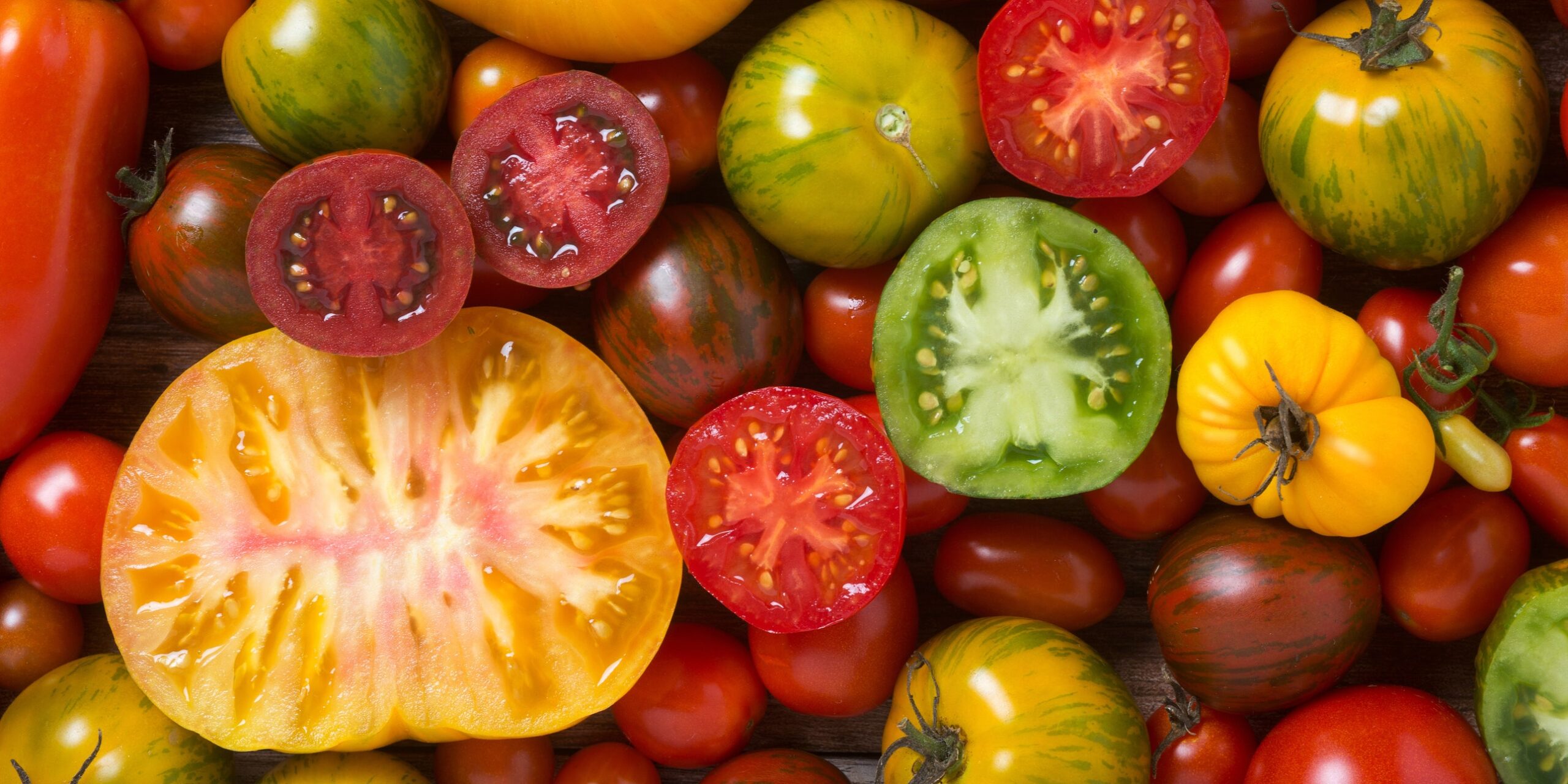The product recommendations in this post are recommendations by the writer and/or expert(s)
interviewed and do not contain affiliate links. Meaning: If you use these links to buy
something, we will not earn a commission.
Canned foods are a great option when you need a quick meal or snack. Beans, meat, fish, soup, and fruit name just some of the items you’ll find in the canned food aisle. While convenience is important for individuals and families with busy schedules, this time saver shouldn’t be at the expense of your health. Although these canned items may save you time in the kitchen and are great for those who aren’t comfortable with much food prep work, you may be surprised at the worrisome ingredients and nutrient profiles in some popular items.
When defining a canned item as “unhealthy,” there are several factors that come into play. The amount of sodium, added sugar, trans and saturated fat, and calories help determine the nutritional value of a product. Additionally, additives, preservatives, food dyes and colorings, and other ingredients can determine how a canned item influences your health.
With so many options available in the canned food aisle, there are plenty that fit into a healthful diet. When choosing which items to purchase, you can narrow down the better options with the following criteria. Look for options with zero added sugar. Canned fruit is an obvious source of sweetener; however, it could also be lurking in unsuspecting savory items. To ensure your pantry is stocked with healthier canned items, avoid those with more than 500 milligrams of sodium per serving, skip options that contain trans fats, and choose products with simple ingredient lists with names you recognize.
For a fool-proof guide to canned food shopping, avoid the following unhealthiest canned food on the planet. Read on, and for more, don’t miss Side Effects of Eating Canned Foods Every Day, According to Science.
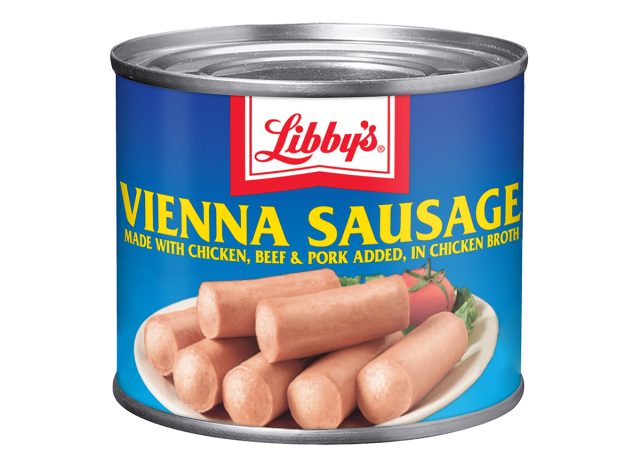

Per serving: 190 calories, 16 g fat (5 g saturated fat, 0 g trans fat), 820 mg sodium, 2 g carbs (0 g fiber, <1 g sugar), 9 g protein
Canned meat is an easy way to add protein to a meal, but you’re better off skipping this option. With nearly twice as much fat as protein, these Libby’s Vienna Sausages are not a lean option. Additionally, this product is made with sodium nitrite, a preservative commonly found in cured meat that may increase cancer risk.
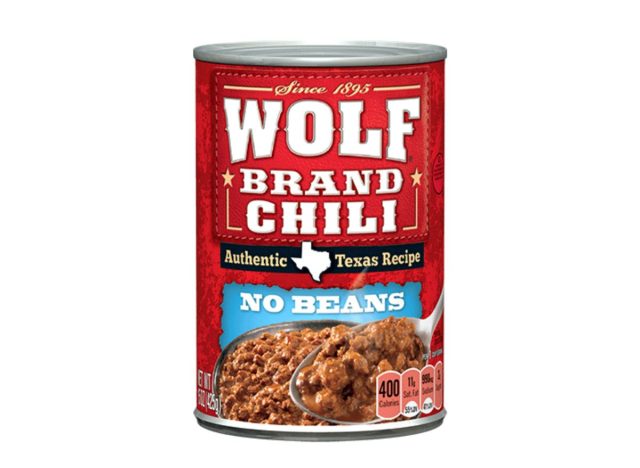

Per serving: 390 calories, 28 g fat (11 g saturated fat, 1 g trans fat), 950 mg sodium, 18 g carbs (5 g fiber, 2 g sugar), 16 g protein
A can of chili can be considered a complete meal as it contains carbs, fat, protein, fiber, and veggies. Unfortunately, Wolf Brand Chili No Beans also comes with a high sodium content and a concerning amount of saturated fat, 41% and 55% of your daily value, respectively. While one serving of this chili only contains 1 gram of trans fat, if you eat the whole can, you’ll be getting close to 2 grams of this worrisome ingredient. Trans fat is linked to cardiovascular disease (CVD), diabetes, and weight gain, and recommendations suggest avoiding it as much as possible.
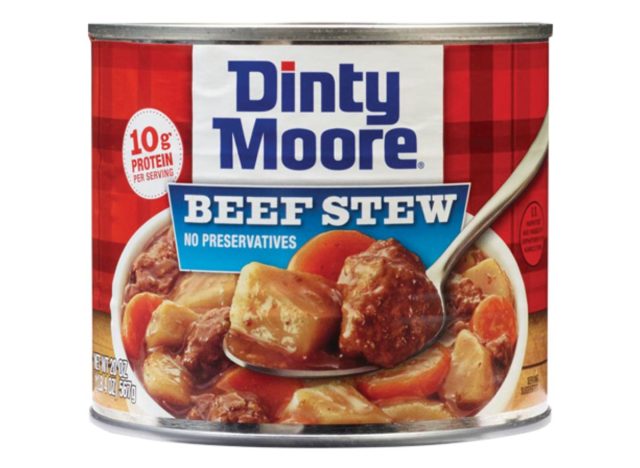

Per serving: 200 calories, 10 g fat (4 g saturated fat, 0 g trans fat), 990 mg sodium, 11 g carbs (1 g fiber, 3 g sugar), 10 g protein
Dinty Moore’s beef stew is one of the highest sodium options on this list. A one-cup serving provides nearly 1,000 milligrams of sodium, which can contribute to high blood pressure and heart attacks. If you eat a whole can of this stew, which is about two cups, you’ll be getting nearly all of your recommended sodium for the day—2,300 milligrams—according to the 2020-2025 Dietary Guidelines for Americans.
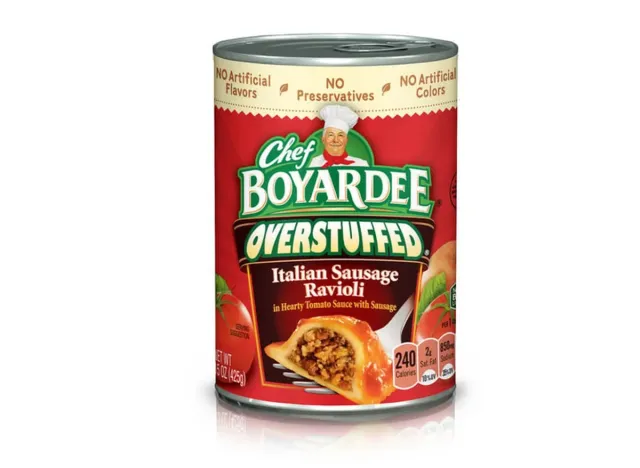

Per serving: 240 calories, 6 g fat (2 g saturated fat, 0 g trans fat), 850 mg sodium, 38 g carbs (5 g fiber, 10 g sugar), 9 g protein
A brand of canned food that is especially popular amongst kids, Chef Boyardee makes an Overstuffed Italian Sausage Ravioli you should skip. While the calories and grams of fat per serving are reasonable, this is another canned item especially high in sodium. Additionally, there is a surprising amount of added sugar in this savory meal—10 grams, which is just shy of what’s in a cup of Kellogg’s Frosted Flakes. Excess sugar intake can increase your risk of diabetes, CVD, certain cancers, and other chronic diseases.
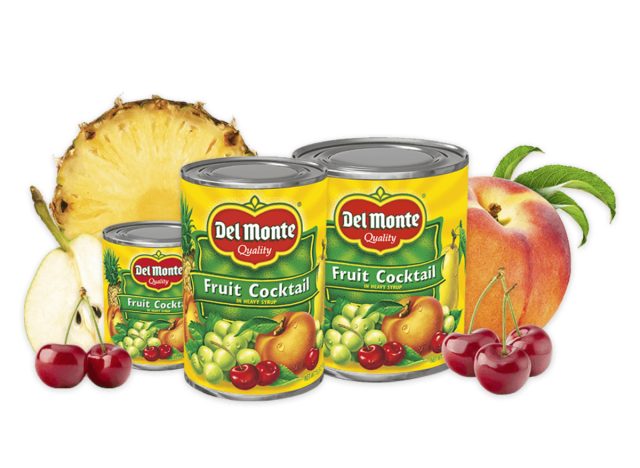

Per serving: 100 calories, 0 g fat (0 g saturated fat, 0 g trans fat), 5 mg sodium, 25 g carbs (1 g fiber, 21 g sugar), 0 g protein
Fruit is a great addition to a meal or snack, but you should stick to fresh, frozen, or canned options without added sugar. A half-cup serving of this fruit cocktail provides 21 grams of sugar. If you eat a full cup of fruit cocktail, you’ll be getting about to same amount of added sugar found in a 12-ounce can of soda. Not to mention, there is less fiber in this canned fruit that an equivalent portion of fresh or frozen fruit.
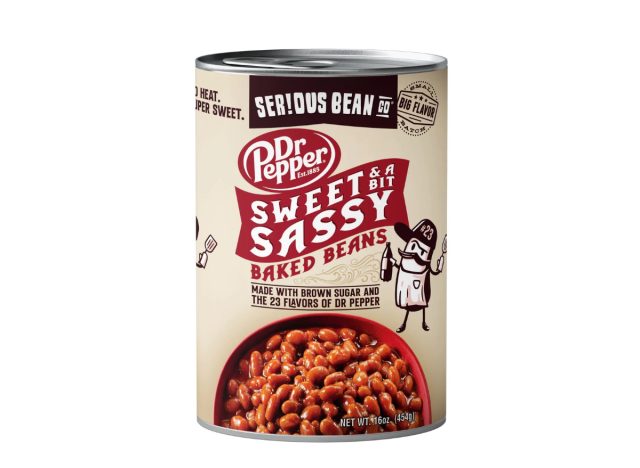

Per serving: 180 calories, 0.5 g fat (0 g saturated fat, 0 g trans fat), 430 mg sodium, 37 g carbs (9 g fiber, 19 g sugar), 6 g protein
While this recipe is reminiscent of the popular soda, it is also packed with added sugar. In general, baked beans are made with added sugar and are better left on the shelves. Beans are a source of fiber, protein, and iron, making them a nutritious food. However, when doused with brown sugar, fructose, and sugar, you’re better off skipping this unhealthy canned food or looking for options made with fewer sweeteners.
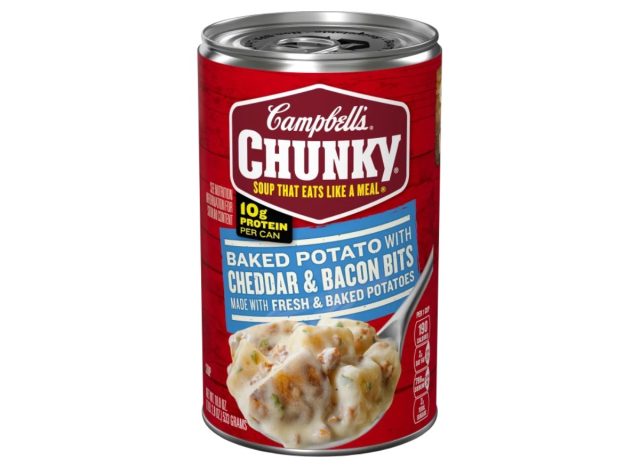

Per serving: 190 calories, 9 g fat (2 g saturated fat, 0 g trans fat), 790 mg sodium, 22 g carbs (2 g fiber, 2 g sugar), 4 g protein
Cambell’s Baked Potato with Cheddar & Bacon Bits soup has a relatively low calorie count, which may make you assign it a “healthy” label; however, this option packs saturated fat, sodium, and sugar while also containing sodium nitrite and sodium phosphate. High levels of phosphate, like what is found in the additive sodium phosphate, may increase mortality rates, and accelerate aging and vascular damage.
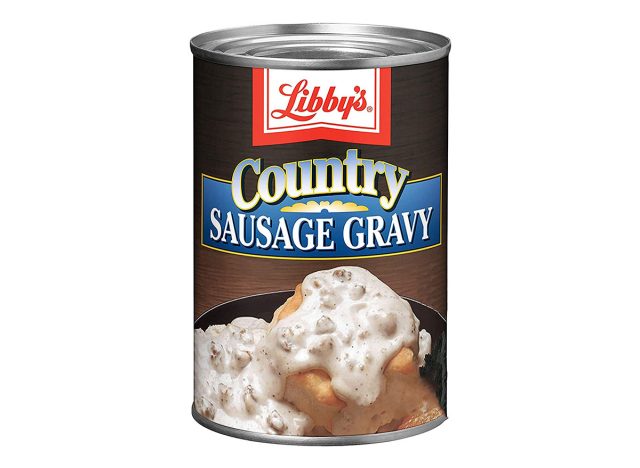

Per serving: 70 calories, 6 g fat (1.5 g saturated fat, 0 g trans fat), 290 mg sodium, 4 g carbs (0 g fiber, 0 g sugar), 2 g protein
Remember the suggestion of choosing canned items with familiar ingredients? This canned gravy is a good example of why. Additives, preservatives, and other questionable ingredients can be found in this item, one of which is caramel coloring. This ingredient is often found in soda and candy, and lurks in processed savory items, too. Caramel color is sometimes produced with ammonia which can mean it may contain cancer-causing contaminants, according to the Center for Science in the Public Interest.
READ RELATED: Protect Your Vision This Summer With 9 Professionals Tips
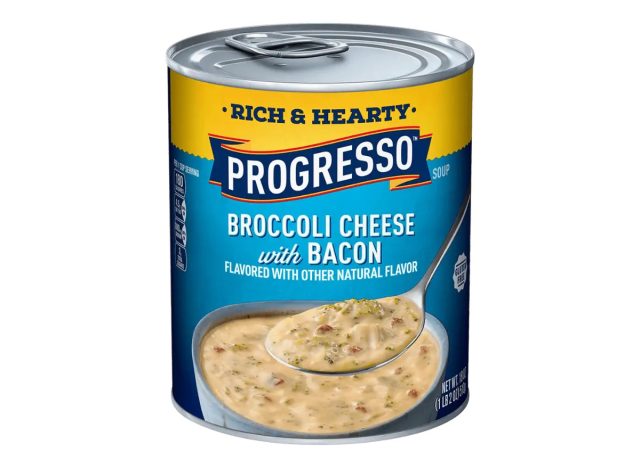

Per serving: 180 calories, 13 g fat (4.5 g saturated fat, 0 g trans fat), 870 mg sodium, 10 g carbs (1 g fiber, 2 g sugar), 6 g protein
Another option packed with unfamiliar ingredients, this broccoli cheese soup with bacon makes this list for several reasons. Sugar, sodium nitrite, and sodium phosphate are a few of the questionable ingredients found in the “rich & hearty” line of soups. You’ll also find nearly 900 milligrams of sodium per one-cup serving. Additionally, with only 1 gram of fiber and 6 grams of protein per serving, this makes a less balanced meal than many other soup options.
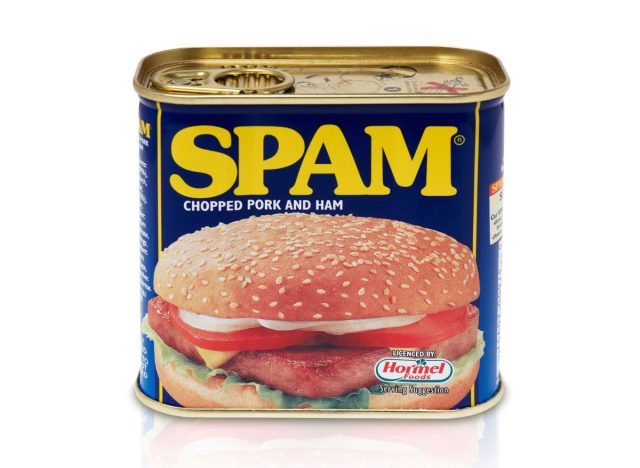

Per serving: 170 calories, 13 g fat (4.5 g saturated fat, 0 g trans fat), 420 mg sodium, 7 g carbs (0 g fiber, 6 g sugar), 7 g protein
A notorious food item that has been available for decades, SPAM is not known for being the most nutritious protein. In fact, a two-ounce portion contains only 7 grams of protein which is less than half the amount found in an equal portion of chicken. Not only does that keep SPAM from being a lean source of protein, but this variety of SPAM also contains sodium nitrite and sodium phosphate, and more added sugar than other varieties.
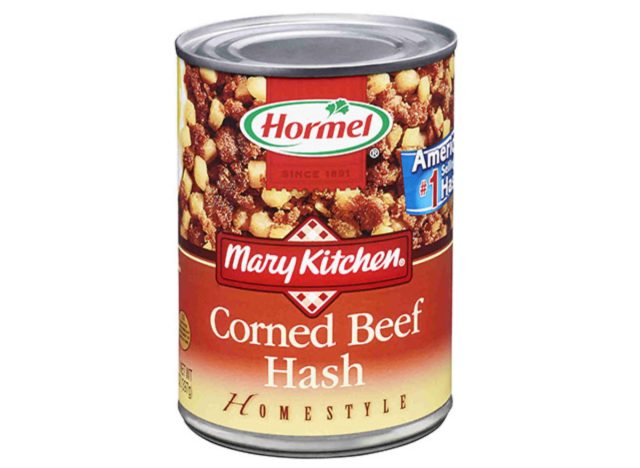

Per serving: 380 calories, 24 g fat (10 g saturated fat, 1 g trans fat), 970 mg sodium, 23 g carbs (2 g fiber, 1 g sugar), 17 g protein
You may be surprised to learn corned beef actually has nothing to do with corn. Instead, this product is largely made up of beef and potatoes, tons of sodium, and also includes sodium nitrate. While you do get some fiber from the potatoes, you’ll also be getting a gram of trans fat per serving and nearly half of the fat grams are from saturated fat. Eating too much of this nutrient can raise cholesterol levels, increasing your risk for heart disease and stroke.
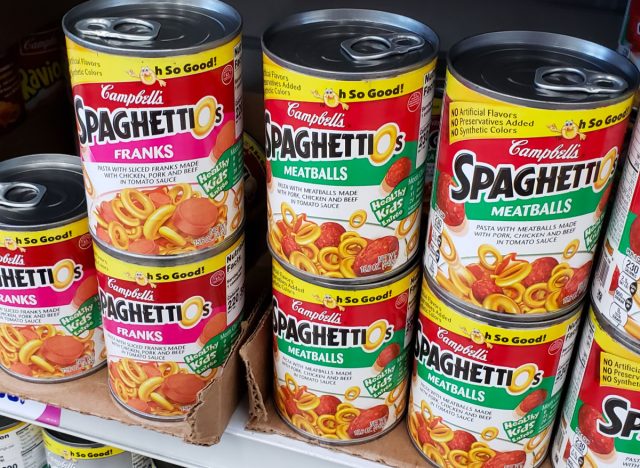

Per serving: 170 calories, 1 g fat (.5 g saturated fat, 0 g trans fat), 600 mg sodium, 33 g carbs (3 g fiber, 12 g sugar), 6 g protein
An option many of us grew up on, Spaghettios aren’t known for their nutrition. While they provide minimal fat and saturated fat, they are quite high in sodium and added sugar. You may not expect high fructose corn syrup (HFCS) in your canned spaghetti, but it is listed as the fourth ingredient in this product. Additionally, the low protein content makes this less ideal for a complete meal.
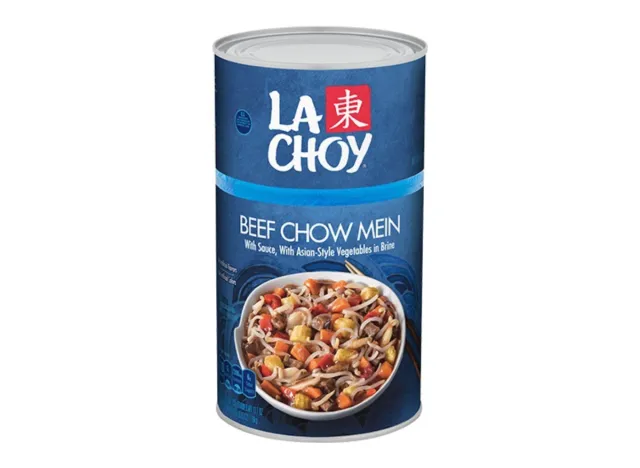

Per serving: 90 calories, 1 g fat (0 g saturated fat, 0 g trans fat), 1,420 mg sodium, 14 g carbs (2 g fiber, 6 g sugar), 6g protein
The low-calorie count per serving may lead you to believe this is a good option; however, you are better off skipping this one. In fact, this item has the highest sodium content per serving on our list! At over 1,400 milligrams of sodium per cup, you are well on your way to exceeding daily sodium recommendations if you eat a full can. Additionally, you’ll be getting added sugar, caramel coloring, and sodium phosphate.
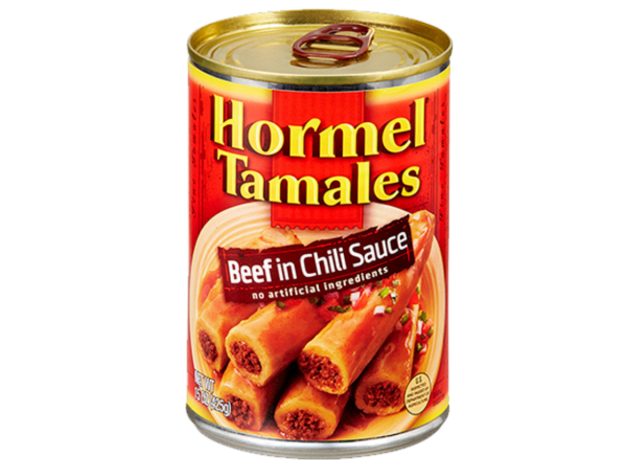

Per serving: 190 calories, 9 g fat (3.5 g saturated fat, 0 g trans fat), 990 mg sodium, 22 g carbs (2 g fiber, 2 g sugar), 6g protein
While the ingredients in this option are better than many others on this list, these tamales pack a worrisome amount of sodium per serving. Additionally, they contain more calories from saturated fat than protein, giving them a less-than-ideal nutrient balance. Lastly, you aren’t getting much fiber per serving, an important nutrient that supports the healthy bacteria in your gut and can lead to smaller blood sugar spikes, amongst other functions.
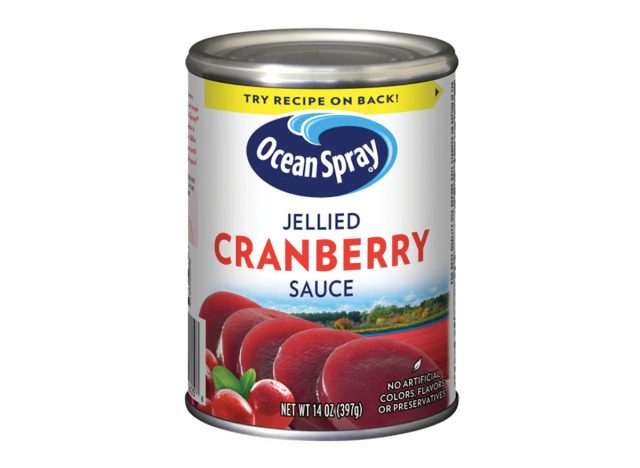

Per serving: 110 calories, 0 g fat (0 g saturated fat, 0 g trans fat), 10 mg sodium, 28 g carbs (1 g fiber, 25 g sugar), 0g protein
Although this item has one of the lowest sodium contents on this list, it is packed with high-fructose corn syrup. This ingredient may increase your risk of metabolic and glucose dysregulation, and obesity, providing plenty of reason to avoid it in your food and drink. Most canned cranberries, jellied or whole form, contain some amount of added sugar. For this reason, you are better off making your own at home.
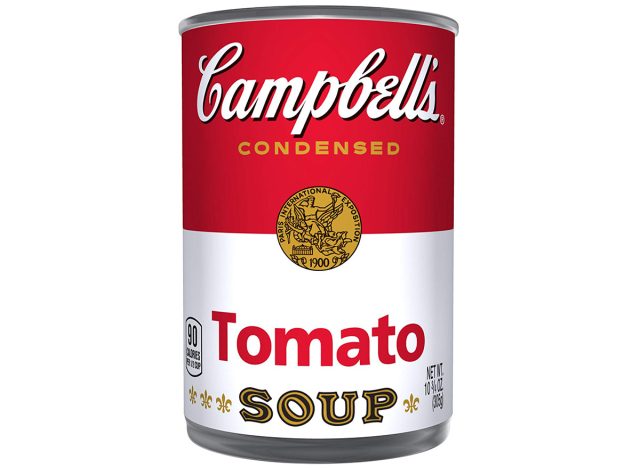

Per serving: 90 calories, 0 g fat (0 g saturated fat, 0 g trans fat), 480 mg sodium, 20 g carbs (2 g fiber, 12 g sugar), 2 g protein
Another pantry staple for many households, this tomato soup is lacking important nutrients, landing it on our list of unhealthiest canned foods. With only two grams of protein per serving, this option doesn’t count as a balanced meal. Additionally, it provides no fat and minimal fiber, making it lacking in essential nutrients. What it does have is too much sodium and added sugar—two ingredients that aren’t known for promoting health.
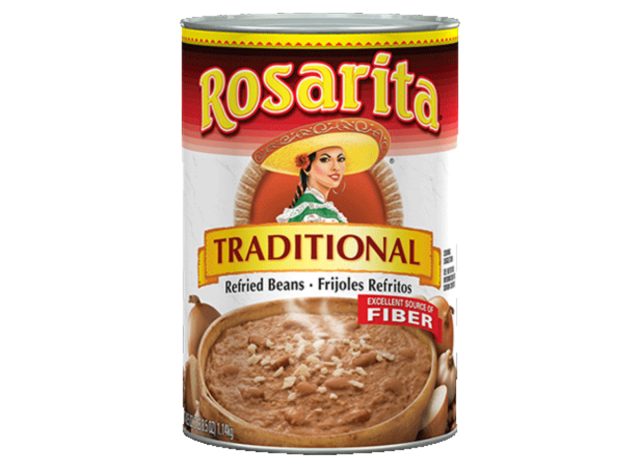

Per serving: 100 calories, 2.5 g fat (1 g saturated fat, 0 g trans fat), 580 mg sodium, 15 g carbs (5 g fiber, <1 g sugar), 5g protein
What this product does have going for it is its fiber content. However, you can get this important nutrient from other canned beans without the added lard. Refried beans are traditionally made with lard, a source of saturated fat that could deteriorate your heart health. Not to mention, a half-cup serving contains nearly 600 milligrams of sodium. Instead, opt for lower sodium, vegetarian beans that are made with oil instead of lard.
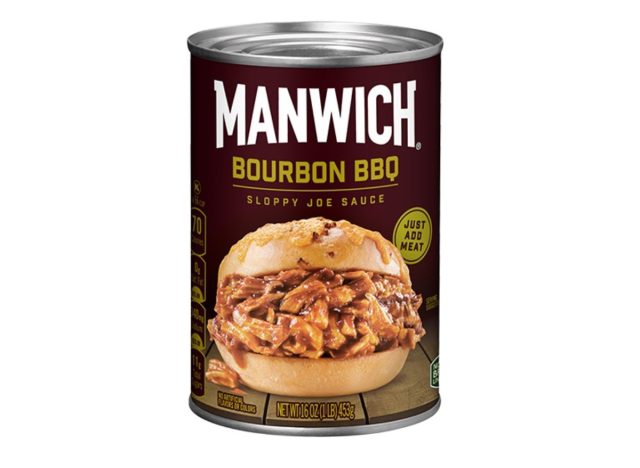

Per serving: 60 calories, 0 g fat (0 g saturated fat, 0 g trans fat), 300 mg sodium, 14 g carbs (<1 g fiber, 11 g sugar), <1g protein
A sauce meant to add flavor to your favorite protein, this unhealthiest canned food does so with sodium and sugar. Sure, tomato puree is the first ingredient providing some acidity to the sauce, but corn syrup is listed as the second ingredient, and molasses and high-fructose corn syrup provide additional sweetness to this sauce. Not to mention you’ll be adding 300 milligrams of sodium per quarter-cup of sauce—but let’s be real, you’ll likely use a lot more than that small serving in your meal.
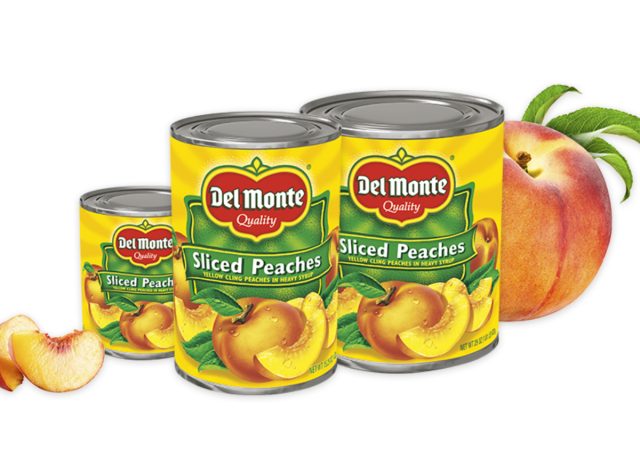

Per serving: 100 calories, 0 g fat (0 g saturated fat, 0 g trans fat), 5 mg sodium, 25 g carbs (1 g fiber, 21 g sugar), 0g protein
Similar to the canned fruit cocktail on this list, these canned peaches are loaded with sugar. In fact, although there are only five ingredients in this food, three of them are types of sugar: high-fructose corn syrup, corn syrup, and sugar. You’re better off with fresh or frozen fruit or canned options without added sugar or syrup.


